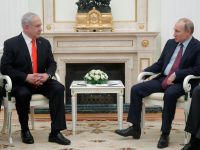Brothers-in-arms turned bitter rivals Meles Zenawi of Ethiopia and Issaias Afeworki of Eritrea on Tuesday signed a peace pact formally ending a border conflict in which tens of thousands were killed and more than a million displaced.
"From now on the war will be against poverty and for peace," said Meles, prime minister of Ethiopia, after the brief signing ceremony at the Palais des Nations 10 kilometers (six miles) outside the Algerian capital.
He stated that the ceremony was an "achievement of immense significance not only for the parties but for Africa."
Afeworki, president of Eritrea, was also conciliatory.
"The chapter of cycles of conflicts and hatred can be closed," he said. "Forget the past and look into a future of peace and of hope for our two brother peoples."
The ceremony was attended by UN Secretary General Kofi Annan, US Secretary of State Madeleine Albright, Nigerian President Olusegun Obasanjo and the Organization of African (OAU) chairman, President Gnassingbe Eyadema of Togo.
It came after an initial cease-fire deal was signed in June between Ethiopia and its onetime Red Sea province in the Horn of Africa, putting an end to fierce fighting that had raged at intervals since May 1998.
After Meles and Afeworki signed the accord, it was initialed by Albright, Annan, OAU Secretary General Ahmed Salim Ahmed, European Union representative Rino Serri and Algerian President Abdulaziz Bouteflika, one of the chief architects of the final accord.
Albright stressed: "The United States is committed to doing our part -- from supporting landmine clearance to providing development assistance. We will reinvigorate our relations with both nations as a matter of both humanitarian obligation and national trust."
The ceremony was performed in a large hall in front of a massive map of Africa.
The final deal is meant to ensure hostilities do not resume after the eventual departure of around 4,500 UN peacekeepers.
It also establishes a border commission to demarcate the disputed frontier between the two countries.
US special envoy to the Horn of Africa, former national security advisor Anthony Lake -- one of the drafters of the accord -- said earlier Tuesday he was optimistic at the chances for lasting peace in the Horn of Africa.
"I am convinced the accord will stick," he told journalists.
"It has been very difficult negotiations, in that each side is committed to making it stick, and therefore they wanted to make sure that every detail was in place and to their satisfaction," he said.
"They have implemented to the letter the cessation of hostility agreement," Lake added. "I would hope that it becomes a precedent for elsewhere in Africa."
Besides the United States, the United Nations and Algeria, which chaired the OAU when the cease-fire was signed, took part in the painstaking process of drafting the final deal.
Declaring the war over, Annan said last Wednesday: "It is a positive story for Africa which ends the year with a story of peace."
The war has had a disastrous effect on the economies of both countries and Annan has called on the international community to give generously to allow both states to reverse that damage.
In May 1991, Meles and Afeworki together toppled the military-Marxist regime of Colonel Mengistu Haile Mariam, the former as leader of the Ethiopian People's Revolutionary Democratic Front, the latter as leader of the Eritrean People's Liberation Front.
Eritrea gained full independence from Ethiopia in 1993, a secession blessed by Addis Ababa.
Once at the helm of their respective countries, however, differences between the two became apparent, especially in their attitudes to economic development, trade, foreign policy and the use of Red Sea ports.
A territorial dispute borne out of the failure clearly to define Eritrea's border led to the breakout of war in 1998.
A fierce bombardment of Eritrea's southern region by Ethiopia in May turned the conflict in favour of Addis Ababa, and the two parties eventually agreed to a cease-fire on June 18th -- ALGIERS (AFP)
© 2000 Al Bawaba (www.albawaba.com)







